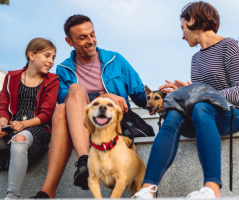Coronavirus and pets – what you need to know
The Coronavirus outbreak is currently affecting many people throughout the world and in some places, changing the way we go about life. There are many questions and myths floating about so we thought we’d help answer, and debunk, a few of them here.
How is Coronavirus spread?
Even though Coronavirus (COVID-19) seems to have emerged from an animal source (the pangolin), the main route of transmission is human-to-human. This person-to-person spread is thought to occur mainly via respiratory droplets produced when a person sneezes, coughs or when coming into contact with infected sputum (hand-to-mouth transmission.)
I’ve heard that dogs and cats can get coronavirus?
There are species-specific coronaviruses that affect dogs and cats but it is important to realise that these are not the same as the COVID-19 strain being transmitted by humans. The strains that affect cats and dogs can cause mild gastrointestinal (enteric) signs and, very rarely, can also cause a much more serious disease in cats called Feline Infectious Peritonitis (FIP).
There is a vaccine available for the canine enteric form of coronavirus. This vaccine should not be used for prevention of the current COVID-19 strain as the enteric and respiratory viruses are distinctly different
Can I get coronavirus from my pet?
No. There is currently no evidence that COVID-19 can be spread from a pet to a human.
Can pets contract COVID-19 from humans?
A single dog has been confirmed to have been infected with COVID-19. This is thought to have been via human-to-animal transmission. The dog had not shown any signs of disease related to COVID-19 at the time this article was written. According to the World Health Organisation, there is no evidence that pets can be infected with, or transmit, the disease to humans.
What should pet owners do?
The best way to help prevent the spread of COVID-19 is to adopt good hygiene measures and this includes washing your hands before and after handling animals. The US Centre for Disease Control recommends that people who are sick, or who have been diagnosed with COVID-19, should restrict their contact with animals (this unfortunately means avoiding cuddling, kissing or being licked by your pet) until further information about the virus is available.
You should always contact us if you think your pet is unwell, or if you have any questions regarding COVID-19 and your pet.

